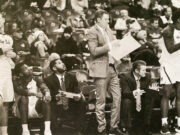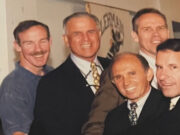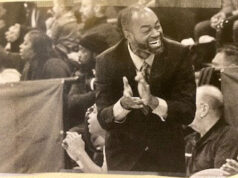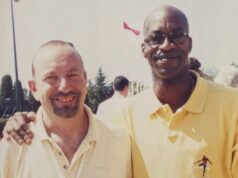With Paul Schienberg, PhD
December 18th, 2005
Soskind: In order to be able to perform well you have to have control of your mind and be able to control all the outside emotions you have in life. One of the things we are fighting most on our team and in classes.
Schienberg: Give me an example of what you do about these emotions.
Soskind: I had the players write down what their fears were. The lack of performance had to do with their fears.
Schienberg: Like what?
Soskind: The way their peers will see them, fear of failure, not knowing what to do. A lot of the guys we are playing against are not afraid. They are more street savvy than our kids are. We are a public school but take top academic students. We’ve lost most of our games – if not all.
Schienberg: Do you have to find out what each kid is afraid of?
Soskind: I’m trying to talk a lot. A lot of kids don’t want to go there – coaches – teachers. Why am I not talking with other kids on the team? It’s like a taboo factor. I talk about the death of my dad and how it affected me. I talk about everyone having fears.
Schienberg: Does the fear show itself as fear or does it show itself as another emotion?
Soskind: It usually never shows itself as fear. It is masked with defensiveness, pouting, anger at times. Our communication is much better. At the end of the day it is not wins and losses and building young men.
Scjoemberg: It must be hard because in this society, winning is almost everything.The media drives it.
Soskind: I’m an educator first. At the high school level it is about education – educating student athletes. The hard part is that coaches get fired. The coach is on the chopping block. The reality is when I’m winning we have good players. When we are losing we don’t have good players. This is especially true in the private high schools.
Schienberg: How much is mental in basketball?
Soskind: Guys when they are physical believe they don’t have to use their minds. When are on the court and under pressure and the other team is running plays at you, you have to recognize it and execute something it. Players fall back on things they do well. A player who likes to dribble will start dribbling immediately in pressure. Like if he is being pressured by three of the other team, will dribble into the trap. I find it interesting that no matter how many times they practice doing something different, they will revert to what they are most comfortable with. This is a big problem here. By the time they get into high school, they are already seasoned. Skills have to transfer into game situations.
Schienberg: You get new kids all the time. How do you keep creating a team concept?
Soskind: It’s everything. There is a selection process. Is the kid a team player or a solo player? I know how the kids will fit in. You can teach a kid how to play. It is harder to find a captain. I don’t like everyone the same, but I will treat you the same. A captain will not ask you to be the captain. Lead by example. Criticize a player on the team if needed. Pick a leader over the skills. Everyone on the team should be able to be the captain of the team. Get bench players to be a coach on the team. If a student does not do his assignment for gym, then he will lose playing time. We are about education. I’m the Athletic Director and Coach of the boy’s basketball team. I want them to repeat what makes them successful. They can’t repeat it.
Schienberg: Is there a coach that is your hero or you emulate?
Soskind: In games I am too much like Bobby Knight. This is something I’m trying to work on. I’m too outwardly vocal. Student athletes are not receptive to up-in-your-face style. Coach K is one of my favorite coaches – his whole assistant staff is his past players. Dean Smith. I feel bad he wasn’t able to control his emotions. But, he never lied. He gets caught up. I’ve got frustrated and hit the table. It’s not that they miss a shot. Does the player put themselves in position to win. There is a block there that keeps them from moving forward. I want the players to share in my intensity. You need to adapt to who your players are.
Schienberg: What kind of problems do you get into with the kids?
Soskind: I don’t get into personal issues even though they carry much with them – broken homes, death, drugs.
Schienberg: What about parents at games?
Soskind: Parents don’t take enough interest in the kids. Parent involvement in the City school systems is much less than suburban schools. I would welcome them being involved. Then there is the over involved parent in the suburbs.
Howard Soskind is the Athletic Director, Boys Varsity Basketball Coach, Physical Education Teacher, and Girls’ Varsity Volleyball Coach for Baruch College Campus High School. He has an MS in Exercise Science and Rehabilitation and will be getting his MSED this year.













